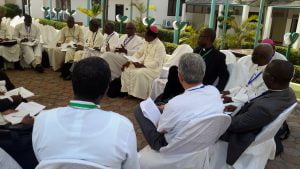 STATEMENT ON THE THEME OF THE RECOWA-CERAO PLENARY ASSEMBLY BY HIS EXCELLENCY THE PRESIDENT OF THE REPUBLIC OF GHANA – JOHN DRAMANI MAHAMA
STATEMENT ON THE THEME OF THE RECOWA-CERAO PLENARY ASSEMBLY BY HIS EXCELLENCY THE PRESIDENT OF THE REPUBLIC OF GHANA – JOHN DRAMANI MAHAMA
February 23, 2016
Greetings
Prof. Gilbert D.D. Kuupole, Vice Chancellor of the University of Cape-Coast and Chairman for the occasion,
Your Eminences, Your Excellencies, Archbishops and Bishops from West Africa, Distinguished Participants and Guests, all other Protocol duly observed.
I am overwhelmed by this massive congregation of Princes of the Church, prelates, priests, religious and lay faithful of the Catholic Church from West Africa and across the globe. I am proud and happy to have you all in Ghana. My Government and I are excited that you chose Ghana as the venue for this important meeting.
Our country is a peaceful and hospitable country. Here, religious tolerance is our hallmark and hospitality a way of life. My government and governments in the past have enjoyed good working relationships with all Religious groups and have collaborated with them in the areas of education, health and social development among others, for the benefit of our people. It is my hope and prayer that this meeting will further deepen this relationship in the years ahead.
Brief Remarks on the theme
The theme chosen for the 2nd Plenary Assembly of the Regional Episcopal Conference of West Africa (RECOWA-CERAO) is the “THE NEW EVANGELISATION AND THE SPECIFIC CHALLENGE FOR THE CHURCH IN WEST AFRICA: Reconciliation, Development, and Family Life”.
I consider this theme highly relevant and appropriate to our everyday developmental needs. Events, activities and actions which eventually culminated in the formation of RECOWA-CERAO in December 2000 in Quagadougou still have immense relevance for all of us in the Sub-Region.
The lesson leaves no doubt in our mind: FAITH and ACTION inevitably lead to concrete RESULTS. We at the governmental level will continue to look up to the Church for inspiration, leadership by example and prayerful support.
The African Situation
I am personally devastated when I see countries, tribes, clans or communities take up arms against their own kin and kith. When this happens, development is seriously impaired and family life painfully disrupted. Many parts of Africa and the world at large have countless heart-rendering tales to tell of shattered development plans and broken homes, all because citizens failed to forgive and forget when it mattered most.
Sister Caroline Osiek, the well-known Professor of New Testament at the Catholic Theological Union in Chicago once wrote: I quote, “It is not Forgive and forget as if nothing wrong had ever happened but forgive and go forward building on the mistakes of the past and the energy generated by reconciliation, to create a new future”.
Christians are referred to in the Bible as the salt of the earth. In many countries in the sub-region, the Christian population is considerable but it is sad to note that more often than not their influence to change the course of national life is very limited. Jesus compared believers to salt for a reason. Jesus used salt to describe how Christians are needed to bring balance and hope to a dying world.
The question he asked, however, is what good is salt if it has lost its flavor and just as salt can become diluted in water, Christians can also become diluted in their faith by their action and inaction. I pray that the Catholic Church will continue to lead by example, teach and reprimand without fear or favour.
“If anyone is in Christ, he is a new creation. Old things have passed away. Behold all things have become new.” (2nd Corinthians chap. 5, vrs 17).
I quote this verse to indicate that time is not on our side. The Social Teachings of the Church must penetrate and influence government policy. This is only possible when those of us who are called Christians live without reproach, above the worldly trappings of the present age. If God called us to a task, he would prepare us for the immense duty of nation building. In Ghana, West Africa and Africa, we are all faced with a series of great opportunities brilliantly disguised as impossible situations.
CONCLUSION
Let me conclude by citing the famous quote by Dr. Martin Luther King Jr. “The ultimate measure of a man or woman is not where he/she stands in moments of comfort and convenience but where he/she stands at times of challenges and controversy.” The Catholic Church in West Africa has shown us that cultural barriers and linguistic strangleholds can be broken if we apply ourselves firmly to the difficult task of achieving unity. We can indeed do all things through Him who strengthens us.
May God bless you abundantly in your deliberations during this 2nd RECOWA/CERAO Plenary Assembly.
Akwaaba, Miawoezor, Soyez les bienvenus au Ghana, Nous vousaimonstrous!
Thank you for your kind assistance.

